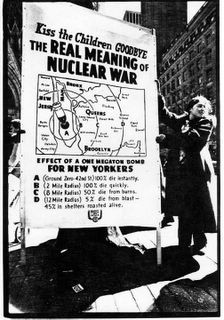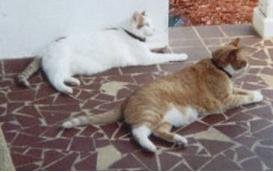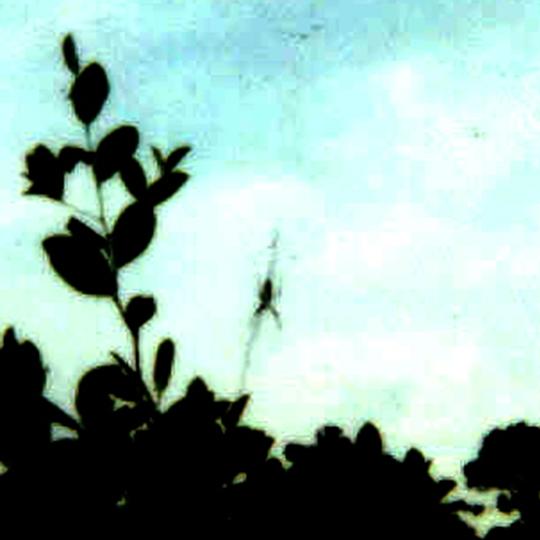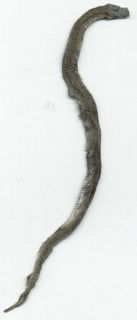
Elizabeth Island (Spy Pond) in Arlington, Massachusetts

About stillness, and honor, and establishing trust in the wild....
Journal excerpt, June 11, 1988
Arlington, Massachusetts
I sit in Hare's Grove, my name for a clearing in a grove of birch, elm, and no doubt other trees. Greens sprout up from a floor carpeted in dead, mulched leaves. About 20 feet to my right, resting under a shade tree, sits Hare, who sometimes stretches out for a brief snooze. His is a beige-and-brown-peppered coat. His forehead bears black markings where there are rents in his fur. I call him Hare because no name seems suitable as yet.
I awoke at 6:30 this morning. By 7:30 I was on my way, walking the mile from my home to Spy Pond, the canvas satchel containing my boat slung over my shoulder. I would have been in the water by 8, but when I arrived several dozen ducks were at my embarkation point, where the earth naturally dips down into the water. Almost all were fast asleep.
Those that were not lazily preened themselves, necks still turned to nestle their heads in their wing feathers. The only other human around was fishing: a large man with red hair and a full red beard, dressed in an undershirt and polyester pants ripped down the leg seams. He walked silently to a spot further down when I arrived.
One by one the colony of ducks began to awaken. I had already pumped up the Intrepid -- my six-foot "inflatable yacht" -- but did not want to disturb them. Two drakes began holding a dialogue; another pursued a female as she quacked loudly and decisively, walking away from him almost to the jogging path. Another male took up the chase. Someone's offended her with some dumb duck joke, I thought.
Two males tried to convince her to come back to the fold: "C'mon honey, we didn't mean it, now join us at the pond and don't be antisocial." The female headed for the parking lot, ready to hitch a ride, but eventually returned.
Others became active and started exploring the shore. I squatted, then sat by my boat, and got out my sesame seeds. I threw several to some ducks that came cautiously near. They inched curiously nearer and feasted, stopping at an invisible barrier. I spotted a quizzical drake and threw a few seeds in his direction. He walked past the barrier; the females followed.
I mentally egged him on: Go ahead, show them how macho you are. Feather in your cap. Finally they were no more than 2 feet away. I distributed a few more seeds, waited for the ducks to waddle elsewhere, and then took my boat to the water's edge.
Some of the ducks had entered the water; the others were up and about. Other humans began pulling their cars into the parking cul-de-sac; the joggers arrived. I rowed to the island and pulled onshore in a small, clear area ringed by ferns. I knew what poison ivy looked like but not poison sumac, so stepped carefully.
I climbed the central hill, which was covered in grasses, trees, ferns. The air was raucous with bird calls. Trees clustered at the top. A sign taped around a tree showed a man littering with a slash drawn through him. It read, in large letters, "Help The Nature," and underneath, in smaller letters, "please." Another request was written in French.
As I began to explore the hilltop a wild hare bounded away from me as fast as he could. I hadn't seen him until he ran; my heavy human steps had startled him. I progressed further, following him North. I passed several coal-blackened spots from cookouts and a couple of pits -- one a mess of filled garbage bags and an old, rusted hibachi holding an emptied milk carton.
I walked further. The "trail" dipped down toward the shoreline. I took it, using tree roots embedded in the soil as steps. I looked out past the foliage, saw the distant house I would use as a marker for this landing point, and turned around.
To my right was the clearing in the grove. No cans. No litter. No one would have a cookout here: this was flat ground, not a pit. The multitude of dead, dried leaves would spark instant flame. Fallen branches and twigs were everywhere.
But it was ringed by trees and dotted with ferns growing up through the leaves. I stepped carefully into it, sinking slightly into the leaves with each step. A plane roared briefly overhead, but for all intents and purposes this was a secluded, sacred grove. For me it was Spy Pond's equivalent of Horn Pond Mountain and its shrine. Instead of climbing up to the Horn Pond Reservoir at the zenith, now I was crossing Spy Pond to Elizabeth Island.
Looking out past the landing and judging from the sun's position I found my cardinal points. I stood in the center of the clearing and bowed deeply first to the East, making my way around until I faced North. I left and made my way back to the Intrepid, put out to pond, and let myself drift. Lazily I looked over the edge and got a clear view of small fish darting around and under the boat -- about 2.5 inches long. Were I quick enough I could have reached out and scooped one up in my hand; the pond teemed with them.
I leaned over the side of the boat and watched. After a few minutes I dipped my fingers into the water and slowly undulated them. Several fish stopped by and watched, fins weaving the water as they hovered. ("Hey, George, d'ya think it's food?" "Naah, what do you think?" "Naah, I don't think it's food....")
I withdrew my fingers from the water and the fish resumed their swimming. Two fishermen in a canoe paddled around the island, casting lines to the fish who, though small in physique, were big in savvy. I drifted under a tree that leaned out from the island, its branches and leaves dipping close to the water. Suddenly I was surrounded by a green canopy on which played sunlight from a cloudless sky reflected off eddying water. Some of the leaves had raised red spots that I took to be insect eggs. Overhead a bird called, jet black until it took flight; then I saw its shoulders edged in red and white crescents that dipped down its back, resembling a graduation robe's hood. I would later learn they were red-winged blackbirds.
I drifted further, through an underwater forest that I saw beneath the surface. Submerged plants thickly grown, through which fish darted. Several egg sacs foamed at the top. Along with skeets that I did not see, ants and spiders that I did see were light enough to walk on the film of the water.
Aquatic plants grew at the island's northeast edge, their bamboo-like stalks jutting one to two feet above the water line. From the top there grew long, tapered leaves similar to mint, but not from that family so far as I could tell. I took the Intrepid to the landing I had found on my island walk and drew it onshore. Backpack and towel in hand I took a few steps in, turned right, and entered the clearing in the grove.
I spread the towel on its bed of twigs and leaves; took out my notebook, pens, and thermos; and stopped. The hare I'd seen earlier had entered the grove. It crouched about 20 feet from me, nibbling on one of the ferns.
I sat stock still, legs crossed, hands on my knees, and watched. I dared not move a muscle. I hadn't realized how much hares move like cats in many respects -- and Hare was the size of a very large cat. His ears flopped down the sides of his head. He sniffed the air, and I wondered if my human scent was masked by sunblock or if he had detected both.
He nibbled one leaf, took a slow hop, nibbled another, took another slow hop. His spine was extraordinarily flexible; his shoulderblades moved silkily. I saw the bright white underside of his short brown-grey tail. His eyes were large and brown, like a cow's or a dog's.
Birds called raucously to my left but I remained rooted in place, head still. Hare & I made eye contact; I blinked. Hare resumed nibbling, turned his back at one point. A good sign, I thought. I wanted to impart calm, safety. To me the grove was a sacred, safe place: No one's going to get hurt.
I sat stone-still, studied him, meditated on the entire biosystem and how we ultimately all come from the same place. In this fashion, Hare and I were related.
Hare moved closer, to a new clump behind 2 neighboring trees -- now about 10 feet from me. Again he nibbled methodically, at times raising himself on his hind legs, front paws touching daintily in front of his chest.
My left leg was quickly falling asleep. Before, I'd ignored short-term itches and tickles from hair worn loose. An ant, carrying a dead comrade, crawled onto my leg and left the corpse there (I don't want him; I thought you guys were cannibals. You take him back.) All of this I could ignore, but I was not yet yogic enough to ignore a leg that was quickly losing all feeling.
When Hare was behind a tree I carefully lifted my leg and massaged it. But relief was only temporary; I knew I'd have to change position. Slowly I drew my knees up. Feeling returned, but Hare spotted my movements and darted back to his old position.
My heart sank. I steeled myself toward patience, became once again immobile, and struggled to hold a new position that was harder than the first. Already I'd heard distant chimes that told me a half hour had passed since I sat down.
Hare continued nibbling, then again moved closer. This time I moved my head -- to check out the birds, watch ants, look up at the tree-ringed sky. To continue to stare only at Hare would have been maddening. My head movements did not disturb him. Again he looked at me; I passively gazed back and then turned my attention elsewhere.
He moved further to my right, still keeping his distance. When his back was turned I slowly lowered my legs back into a cross-legged position. Hare moved closer, nibbling a new plant. I turned my head to observe him and kept the rest of myself still.
Then he hopped up to my blanket and it was all I could do to contain myself. Now I was completely still, allowing not even head movements, only those of my eyes to follow him. He crossed in front of me and I looked into extraordinary, gentle brown eyes. I studied the black markings on his forehead, his fur with its dark grey and brown striations, the light brown on his shoulders.
He hopped around my left side, on the blanket, and to my rear. I held my position, didn't dare turn around. I felt him sniffing the small of my back and a lump formed in my throat. Tears nestled in my eyes. I tried to still my breathing and wash over my emotions with calm. I felt incredibly honored -- there is no other word for it -- that this creature would show me such trust.
Hare hopped back to the front of the blanket and, still sniffing, touched his nose to my knee and butted it a couple of times. He then saw my backpack and went immediately toward its outer pocket. Inside were my sesame seeds and a peanut butter sandwich wrapped in tinfoil; he'd caught the scent of the sandwich.
He tried to dig into the pocket but it was zippered shut. I thought, Look, kid, I'd love to oblige you -- but if I reached out to open the pocket you'd bolt like a bat out of hell.
After a minute of useless digging, Hare gave up and moved before me once more, by my knee. Slowly I extended my hand, and he hopped away, to his last position at the leaves about 8 feet away and to my right. I ignored him. Very slowly, gaze riveted on my backpack, I reached over and unzipped the pocket. I concentrated intently on what I was doing, which attained the ritual and deliberateness of a Japanese tea ceremony.
I removed the sesame seeds first, opened the container, and set it on the blanket. Then I removed the sandwich and placed it on my lap. One slow movement at a time, never swerving in thought or action from the task, I unwrapped the tinfoil, removed the sandwich, tore off a large corner, and placed it on the blanket. Then I re-wrapped the rest and returned it to its pouch.
I straightened and looked back toward Hare. Hare continued to nibble. He looked back at me. I met his gaze, then turned my attention elsewhere.
He hopped back to my blanket, stopping first at the closer container of sesame seeds. He leaned toward it, sniffing, then took the lip of the container in his mouth and drew it closer to him. Still on the blanket, he sampled a few of the seeds and then abandoned that, letting a couple of half-chewed seeds drop back into the plastic.
Well that's rude, I thought, smiling.
He took a hop closer and sniffed the sandwich corner at my side. Then he took the whole thing in his mouth, hopped a few short hops away, and savored it. When finished, he retired to a shade tree about 20 feet to my right and stretched out for a snooze. As close as he'd been to me before, he had been fully awake and alert. Now he was stretched out and napping before me.
Quietly, slowly, I reached for a napkin and dabbed at my eyes, and named this place Hare's Grove. I took out, unwrapped, and ate the rest of my sandwich, then scooped out the top layer of sesame seeds and tossed them to my left, for the birds. I reached for my notebook and wrote. Throughout, Hare alternately snoozed and sat, undisturbed by anything I did. Even when I moved my provisions and stretched out on the blanket to face him, he remained at ease.
Throughout, my blanket was becoming a burial ground for ants. The live ones were obviously housecleaning, carrying their dead and depositing them on a surface that bore no relation whatsoever to their natural environment. I took my napkin and flicked them -- and their morticians -- off the blanket.
When I was ready to leave I slowly packed my things and stood, trying to be as quiet as I could while crunching leaves and breaking twigs. Hare watched me intently -- it was the first time I'd stood during our encounter. I draped my towel over my arm and carefully trod the path back to the Intrepid. To do so I had to move closer to Hare, who hopped a few steps away and then held still. I continued on, increasing my distance from him, then looked back. He sat regarding me, then busied himself nibbling.
I walked back to the boat where, well away from Hare, I vigorously shook my blanket free of dirt, replaced it in the Intrepid, and launched into the water. I let myself drift once more and stretched out, my head pillowed on the bow. I trailed my fingers in the water, watched fish and undulating sea plants. Watched and listened to a menagerie of birds.
When I felt I'd soaked in enough heat, I rowed back to shore and the ducks, let the Intrepid deflate, and watched the dozens of sunbathers and children who had come to the pond while I'd explored the island. When I could fit the Intrepid into my canvas satchel I packed it, hefted the satchel over my shoulder, and headed home.









